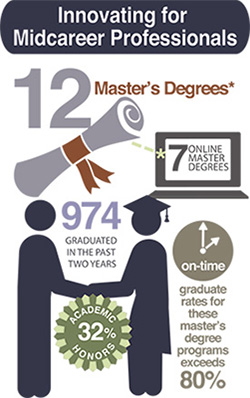The Achievements: The outcome is a significant shift in the portfolio of programs and organizational capacity, with a focus on graduate education. Through self-support, CSUN now offers 12 master’s degrees and 8 graduate credit certificate programs, with 7 master's degrees offered fully online. In the past two years 974 students have graduated from these programs, 32% with academic honors. The on-time graduate rates for these programs overall exceeds 80%, some programs rates reaching 90% or more. (One of the latter achieved 100% on-time graduation two years in a row.) One of CSUN’s fully online programs with an on-time graduation rate at or above 90% is in a field that requires students, as a prerequisite to professional practice, to take a national licensure examination after completing a master’s degree. Graduates of this program have a first-time pass rate on the licensure exam of 94.2%, as compared to the national average of 86.3%. In the next couple of years, CSUN will introduce no fewer than 6 additional master’s degrees, and the number of fully online degrees is expected to multiply.
The shift in focus from noncredit to graduate degree and graduate certificate programs has increased teaching and earning opportunities for faculty. The positive financial margin provides returns to CSUN as a whole and to the colleges and departments collaborating with CSUN’s self-support unit in creating these programs. With its reputation as a provider of advanced professional education, CSUN is well positioned to increase its applied research contracts.
The Model Extended: CSU campuses in urban regions served by a large number of public and private colleges and universities would do well to focus their self-support capacity on post-baccalaureate degree and graduate credit certificate programs. Such a focus not only meets a growing educational need in a region of that kind but also offers an important pathway to distinction. Robust graduate programs, whether state-funded or self-supported, attract excellent faculty and nurture disciplines of growing importance in the regional and state economies. The income generated by such programs allows a campus to adequately remunerate the program faculty, who can thus remain engaged in developing the campus’s curriculum, reputation, and relationships in the field in question. First-rate graduate programs for midcareer professionals advertise a campus’s applied research capabilities; hence they engender research contracts with employers for whom the field in question is central. In return, such employers are likely to hire program graduates, thus enhancing the campus’s reputation and widening its supportive relationships. Finally, offering graduate programs fully online extends the campus’s reputation to national and international levels.








